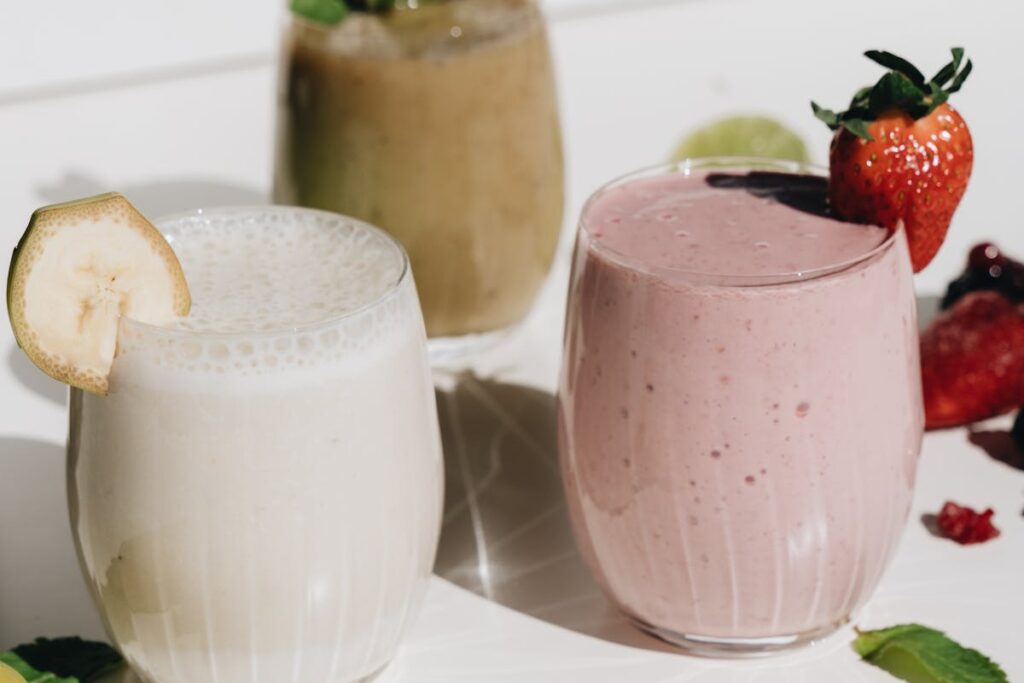The recovery process after dental implant surgery necessitates a dietary shift towards softer foods that facilitate healing without causing discomfort. Among the myriad of options, six stand out for their nutritional value and gentleness on the oral cavity: scrambled eggs, vegetable broth, Greek yogurt, mashed avocado, pasta, and banana smoothies. Opting for these foods can make the post-operative period more manageable, ensuring your nourishment is not compromised. However, the question remains: what makes these six choices particularly beneficial for recovery, and are there specific ways to prepare them that maximize their restorative potential?
Scrambled Eggs for Protein
A substantial number of patients find scrambled eggs to be a nutritious and easily consumable option post dental implant surgery. This soft food is not only gentle on the oral cavity but also packed with proteins, essential for tissue repair and recovery.
As one of the richest protein sources, eggs provide the necessary amino acids the body requires to build and repair tissues, including the gums and bones affected during dental implant procedures. The protein content remains the same across egg variations, offering the versatility of choice based on personal preferences.
Scrambled eggs, in particular, are beneficial as they can be ingested without much chewing, reducing the risk of discomfort or damage to the implant site. Additionally, they are quick to prepare, and their creamy consistency can make the post-surgical diet less monotonous.
Egg variations such as poached or boiled can also be considered, provided they are chopped finely or mashed. For added nutritional value, patients could combine eggs with soft, non-acidic vegetables or finely grated cheese.
To conclude, incorporating scrambled eggs into the post-surgery diet can contribute considerably to the healing process, making them an ideal recommendation for patients post dental implant surgery.
Soothing Vegetable Broth
While scrambled eggs serve as a protein-rich option, soothing vegetable broth emerges as a comforting and easily digestible choice after dental implant surgery. The warmth of the broth helps to alleviate discomfort, while its liquid consistency makes it an ideal option for those who are unable to chew or bite down.
Among the many broth benefits are its rich vitamins and minerals that aid in recovery and boost the immune system. These nutrients come from the vegetables used in the broth, such as celery, carrots, and onions. Additionally, vegetable broth is low in calories, making it a suitable option for those mindful of their caloric intake.
Vegetable broth also offers a variety of flavor variations. The type of vegetables used, the addition of herbs and spices, and the duration of simmering can all influence the final taste. Here are some options:
- Using root vegetables like parsnips or turnips for a deeper flavor
- Adding fresh herbs such as parsley or thyme for an aromatic twist
- Incorporating spices like turmeric or ginger for their anti-inflammatory properties
- Simmering the broth for longer periods to intensify the flavors
Nutrient-Packed Mashed Avocado
Shifting our focus from savory broths, another nourishing choice for post dental implant surgery is the nutrient-packed mashed avocado. This creamy, green fruit is not only smooth and gentle on your mouth but also loaded with crucial nutrients that aid in healing and overall health.
The avocado benefits are manifold, particularly for those recovering from oral surgery. Avocados are high in healthy monounsaturated fats that facilitate wound healing and reduce inflammation. They are also rich in vitamin K, vitamin E, vitamin C, and B-vitamins, all of which are essential for peak recovery. Besides, avocados are an excellent source of fiber, aiding digestion when your body is under stress from surgery.
Mashed avocado recipes are versatile and easy to prepare, making them an ideal choice for post-surgery diets. You can enjoy it plain, seasoned with a bit of salt and pepper, or combined with other soft foods like cooked vegetables or tofu for added flavor and nutrients. One popular way to consume it is as a spread on soft, whole-grain bread. Regardless of how you choose to enjoy your mashed avocado, rest assured that you are nourishing your body with one of nature’s most nutrient-dense foods.
Creamy Greek Yogurt
Another excellent option for consumption after dental implant surgery is creamy Greek yogurt. High in protein and packed with essential nutrients, Greek yogurt is a wholesome, soft food that can be easily consumed post-surgery.
Greek yogurt offers numerous health benefits. Its high protein content aids in tissue repair and recovery, a significant aspect after any surgical procedure. The probiotics found in Greek yogurt also boost the immune system and improve gut health, further supporting the healing process.
For those who might worry about palate fatigue, the diverse flavor variations of Greek yogurt can keep your taste buds engaged.
Here are some key points to keep in mind:
- Greek yogurt is rich in calcium and vitamin D, promoting bone health—which is essential after dental implant surgery.
- It has a smooth, creamy texture that requires little to no chewing, making it ideal for those with sensitive mouths.
- You can enhance its nutritional profile by adding soft fruits like bananas or berries.
- Greek yogurt is also versatile and can be a part of various recipes that adhere to your post-surgery dietary restrictions.
Incorporating Greek yogurt into your post-surgery diet can efficiently contribute to your recovery while ensuring taste and variety.
Easy-to-Eat Pasta
For those recovering from dental implant surgery, easy-to-eat pasta presents a comforting and palatable option. The softness and adaptability of pasta make it ideal for individuals with oral sensitivity or discomfort.
The pasta texture plays an essential role as it directly impacts the ease of consumption. Opt for types of pasta like tortellini, ravioli, or farfalle, which are known for their soft, gentle textures. Overcooking the pasta slightly can also make it softer and easier to chew.
Pasta sauces are another vital aspect to keep in mind. They not only enhance the flavor, but also contribute to the overall softness of the dish. Creamy sauces such as Alfredo or béchamel are excellent choices because of their smooth consistency. Tomato-based sauces can also be used but should be strained to remove chunks that can cause discomfort or difficulty while eating.
Incorporating well-cooked vegetables, such as spinach or zucchini, can provide added nutrition. However, these should be finely chopped or pureed to avoid any chewing difficulties.

Delicious Banana Smoothies
Shifting our focus to a nutritious and invigorating option, we now explore the subject of delicious banana smoothies. Not only are they satisfying and easy to consume after dental implant surgery, but they also provide essential nutrients for recovery. We will discuss the necessary ingredients for a banana smoothie and guide you through the preparation steps, ensuring a smooth and enjoyable experience.
Banana Smoothie Ingredients
Smoothie lovers appreciate the simplicity and nutritional value of a well-prepared banana smoothie. Not only is it a delicious treat, but it also offers various health benefits, making it an ideal soft food to consume after dental implant surgery.
The basic ingredients for a nutritious banana smoothie typically include:
- Ripe bananas: They provide natural sweetness and creaminess, as well as essential nutrients like potassium and vitamin B6.
- Milk or plant-based alternatives: These add protein and help achieve the desired smooth consistency.
- Yogurt or a dairy-free substitute: This ingredient contributes to the smoothie’s creaminess and adds probiotics for digestive health.
- Ice cubes: They help chill the smoothie, making it more invigorating and enjoyable.
However, there’s room for creativity when it comes to banana smoothie variations. Adding ingredients like spinach or other fruits can increase the nutritional value and alter the flavor profile. For example, berries can add antioxidants, while nuts or seeds can provide healthy fats and proteins.
Smoothie Preparation Steps
After gathering your chosen ingredients, the process of creating a delicious and nutritious banana smoothie can commence. The first step involves peeling and slicing the banana into smaller chunks. This not only facilitates easier blending but also contributes to a smoother smoothie texture, which is an essential element for those recovering from dental implant surgery.
The next step is to add the banana pieces into a blender, followed by the addition of milk, yogurt, or a dairy-free alternative. The ratio of these ingredients can be adjusted depending on your desired smoothie texture. A larger proportion of liquid will result in a thinner smoothie, while more banana or yogurt will yield a thicker consistency.
Once the main components are in the blender, you can introduce flavor variations. You may add honey for sweetness, a dash of vanilla or cinnamon for fragrance, or even a scoop of protein powder for added nutritional value. Blend these ingredients until smooth.
Pour the blended mixture into a glass and serve immediately for the best taste and nutrient preservation. If preferred, the smoothie can be chilled in the refrigerator before serving. This simple yet versatile banana smoothie recipe provides a soft, nourishing option for post-dental implant care. Enjoy experimenting with different flavor variations to suit your preferences.
Frequently Asked Questions
Can I Still Eat Spicy Foods After Dental Implant Surgery?
While spicy foods aren’t necessarily harmful after dental implant surgery, they may cause discomfort. It’s important to reflect on spicy food precautions and healing process considerations to guarantee a smooth recovery and avoid potential complications.
How Long Should I Stick to a Soft Food Diet Post-Surgery?
Typically, it’s recommended to adhere to a soft food diet for about two weeks post-surgery. This healing timeline guarantees safety for the implants and comfort for the patient while offering a variety of soft food options.
Are There Any Drinks I Should Avoid After Dental Implant Surgery?
Post-surgery hydration is essential, yet certain beverages should be avoided. Highly acidic, sugary, or alcoholic drinks can impede healing. Stick to safe choices like water, herbal teas, and non-citrus juices for ideal recovery.
What Precautions Should I Take While Eating After a Dental Implant Surgery?
Post-surgery, it’s crucial to adopt gentle eating techniques to not disturb the implant site. Opt for soft, non-sticky foods and chew on the opposite side. Avoid hot food and drinks until numbness subsides.
Can I Eat Meat or Hard Foods With Caution After Dental Implant Surgery?
Following dental implant surgery, it’s advisable to avoid hard foods, including meat. Prioritize meat alternatives and soft proteins, such as tofu or well-cooked legumes, to promote healing while still meeting your nutritional needs.
